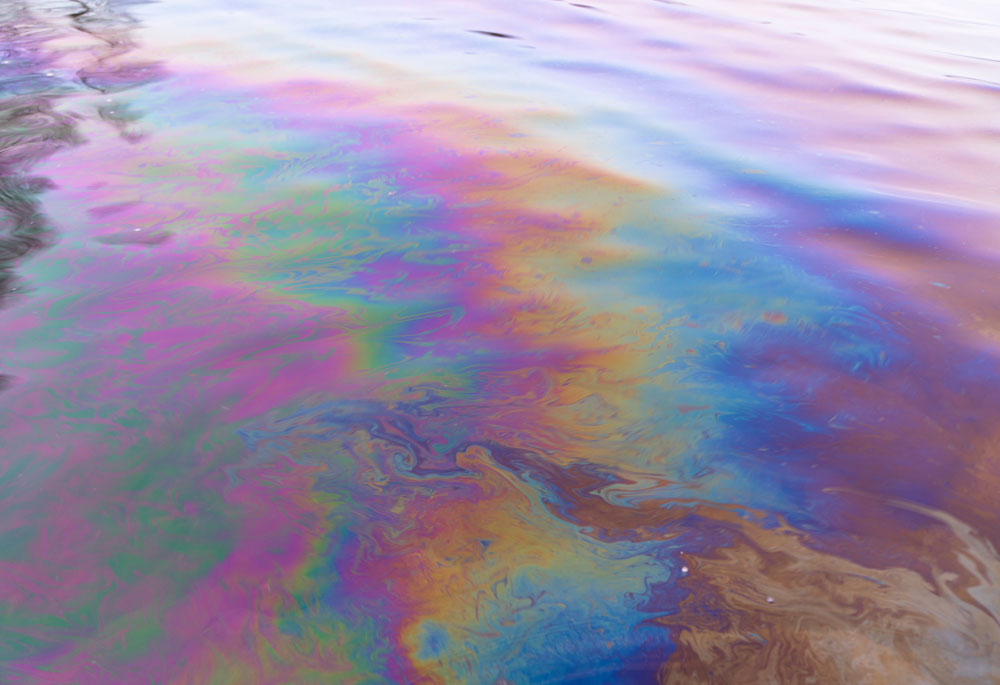How To Clean Up Oil Spills In Water
 CONTENTS
CONTENTS
- What are the effects of oil spills in water?
- Why you must not attempt to clean oil spills yourself
- What you should do when an oil spill happens
- How to prevent oil spills in water
- Get in touch
We normally think of oil spills as large slicks in the ocean caused by tankers running aground. But spills in waterways like rivers, canals, and lakes are far more common and could have just as serious an impact on the environment.
Here at ICE Cleaning, we can provide quick and effective oil spill cleaning. Our technicians are permitted to handle and discard of oil, including surface and water oil spills. They are available nationwide and can be on site in a matter of hours in an emergency.
Keep reading to find out how to clean up an oil spill in water.
What are the effects of oil spills in water?
Crude oil and petroleum products are very hazardous substances that consist of toxic chemicals including benzene, toluene, and nitrogen. Oil can contaminate water and the air, and inhaling the vapours it produces, or touching or ingesting it could cause health problems including:
- Memory loss
- Headaches
- Nausea and vomiting
- Chest pain, coughing, and lung problems
- Skin injuries, blisters, and rashes
Long-term exposure can lead to more serious issues including cancer and decreased immunity. Should you drink water that contains oil, you may also get an upset stomach and experience nausea, vomiting, and diarrhoea. You can find out more about the dangers of oil spill exposure here.
Some animals are particularly vulnerable when oil spills in water. Here are some of the effects it can have on aquatic life:
- When they try to clean the thick, sticky substances off themselves, they can ingest the toxic chemicals and suffer from organ damage
- They may accidentally eat or inhale it and poison themselves
- It affects fur-bearing mammals’ ability to insulate themselves, putting them at risk of hyperthermia
Why you must not attempt to clean oil spills yourself
Firstly, you will be in much closer contact with the oil, and are more likely to touch or ingest it, or inhale its fumes.
It is also likely you might not clean it up effectively and could leave behind a dangerous environment. You may wash it down the drain or let it spill onto soil, too, where it could leach into ground water and enter waterways.
Oil spills in water are especially difficult to clear up. In the ocean, for example, it can spread over a wide area very swiftly thanks to winds, currents, and tides. It can cause serious pollution before remediation teams are even deployed.
Spills in waterways are considered even more difficult to clean up. This is because vegetation grows on the shorelines which is harder to clean than sand, and the oil can mix with sediment which will drag it to the riverbed.
Only oil spill damage cleaning companies with specialist training and equipment should tackle spills, particularly those in water.
What you should do when an oil spill happens
If oil spills on your property
Although it may be tempting to quickly wipe a small puddle of oil from your leaking car engine or oil tank, don’t attempt to clean it up yourself.
Instead, contact your insurance company as soon as you spot it. They will help you find oil spillage cleaning companies to clear it up.
If you spill oil in the workplace
Should you use or store oil, you will probably already have a spill response plan to follow. You can find out more about what to include in your plan in this blog.
Unless you or your staff are trained in oil spill remediation, you must bring in specialist cleaners. They will quickly contain its spread, stop it going down drains or spreading onto soil, and clean it up.
If your boat spills oil into water
Clean it up if you have a spill kit and experience remediating oil in water, or call the Environmental Agency incident hotline to report the spill.
How to prevent oil spills in water
- Inspect equipment for leaks, corrosion, and holes that could cause an oil spill
- Use and store less oil to reduce the chance of a large spill
- Regularly conduct oil spill response training to ensure a quick, effective reaction
- Don’t attempt to remediate oil yourself – contact professional cleaners immediately
Get in touch
Our technicians can quickly take care of an oil spill and restore contaminated water as close to its original state as possible. They are available 24/7, 365 days a year, including bank holidays.
To book our technicians for oil spill cleaning or water oil containment clean up, contact our team at 0208 066 0360 or enquiries@icecleaning.co.uk.

Speak with me today,
I’m here to help
By asking you a few questions either via phone or email I can immediately provide a realistic estimation of the cost.
You’re in good company. We’ve cleaned for the following commercial clients… View all

Why choose us?
- Cater to a wide variety of cleaning situations
- Nationwide coverage, available 24/7
- Cater to commercial and domestic clients
- Free survey provided prior to quotation
- Emergency response team
- Offer a bespoke service designed to suit all your needs
- All technicians hold professional health and safety qualifications, including BICSc, IOSH, Dewpoint Professional & Safe Contractor
We’re fully accredited
We place best practise, professional expertise and health and safety at the core of our business. We’re fully compliant with all legal obligations. You can view a list of our accreditations below, or visit our Health & Safety page for more information.











-RGB-small.1707319151.jpg)




















